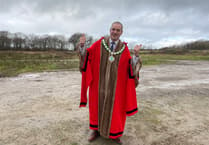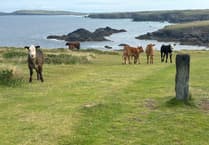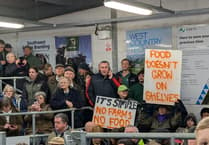At a meeting with local farmers in Bradworthy last week, I discussed with NFU members the role of agriculture within the scope of our wider national economy. Strong economic growth is essential for improving living standards, and that is particularly true in rural constituencies such as Torridge and West Devon, where opportunity can often be sparse.
While I was pleased to hear local farmers tell me that prices were buoyant, I also understood the concerns they raised about the cost of operating. We are living in turbulent times, and the spike in oil and gas prices has had a dramatic “knock on” effect on the cost of diesel, fertiliser, and feed. A number of my constituents who work in food production have written to me or called my constituency office to share their worries about agriculture commodity prices; their views have re-affirmed my conviction that this is a matter of immense local importance.
I will continue to lobby my ministerial colleagues, making plain that farmers here in Devon — who form the backbone of our local economy — should receive the maximum possible assistance. That means delivering changes in policy to support the choices that individual farmers make for their farms, as well as bolstering food production and boosting agricultural productivity.
To that end, I welcome the Government’s decision to delay changes to the use of urea fertiliser by at least one year, and the publication of improved statutory guidance on how farmers can limit the use of slurry and other farmyard manure across certain seasons but I was particularly pleased to learn that DEFRA had ordered a review of the design of the new Environmental Land Management Scheme (ELMS) that is to replace the old EU area based payments.
Earlier this year, I drew attention in the House of Commons to real and foreseeable problems about the current development of the new schemes, which were failing to attract farmers to participate in them. A show of hands at the meeting last week, once again confirmed that to be accurate. Therefore, I welcome the Government’s decision to take stock of the current direction of ELMS and to ensure that the critical priority of food security is properly reflected in them. I have discussed this with the Secretary of State and I understand there is no intention whatsoever of abandoning the important environmental objectives of the new scheme, but a recognition that those objectives can only be met if farmers are encouraged to sign up to it in large numbers. That will require, at least, simplification of the schemes and better rates of remuneration for the Sustainable Farming Incentive, which is the basic component of ELMS.
I understand that the Government has also announced that it will pay farmers to help with the cost of sowing nitrogen fixing plants and green manures in their crops to substitute some of their fertiliser requirements for the coming season. It is my hope that this assistance will make some small contribution to reducing costs on expensive manufactured fertilisers, which are often linked to the price of gas.
As I have said, as these vital issues are being resolved over the coming months, I will continue my dialogue with our local farm businesses and with ministers over farming policy.





Comments
This article has no comments yet. Be the first to leave a comment.